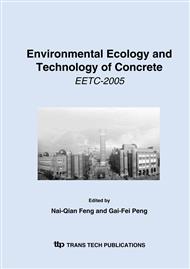p.180
p.184
p.191
p.197
p.204
p.211
p.218
p.223
p.230
Study on Improvement of Concrete Durability by Using High Performance Cement
Abstract:
Sulphate ion and chloride ion existed in the alkaline saline soils may cause serious problems on the durability of reinforced concrete structures, while it is found that superfine mineral powder plays positive role in the precaution of the alkaline saline corrosion. A composite cement named high performance cement (H.P.C) composed of clinker, metakaolin and fly ash powder in appropriate proportions is developed with good performance in preventing concrete from alkaline saline soil corrosion. Mortar bar test and visual examination showed that the cement could effectively control AAR and sulphate ion related expansion, and the charge passed tested according to ASTM C1202 was decreased to “negligible” level for concrete with W/B ratio of 0.3, and “very low” grade for concrete with W/B ratio of 0.45 and 0.55 when the high performance cement was used. Other properties such as low hydration heat and anti-freezing properties, as well as the uniformity of the fresh concrete (with no bleeding and segregation), made it an important material in the construction of concrete structure in alkaline saline soils.
Info:
Periodical:
Pages:
204-210
Citation:
Online since:
January 2006
Authors:
Price:
Сopyright:
© 2006 Trans Tech Publications Ltd. All Rights Reserved
Share:
Citation:


